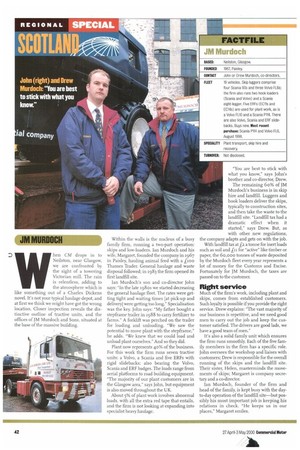Vir
Page 44

If you've noticed an error in this article please click here to report it so we can fix it.
D hen CM drops in to
Neilston, near Glasgow, we are confronted by the sight of a towering Victorian mill. The rain is relentless, adding to the atmosphere which is like something out of a Charles Dickens novel. It's not your typical haulage depot, and at first we think we might have got the wrong location. Closer inspection reveals the distinctive outline of tractive units, and the offices of J M Murdoch and Sons, situated at the base of the massive building. Within the walls is the nucleus of a busy family firm, running a two-part operation: skips and low-loaders. Ian Murdoch and his wife, Margaret, founded the company in 1967 in Paisley, hauling animal feed with a Too Thames Trader. General haulage and waste disposal followed; in 1983 the firm opened its first landfill site.
Ian Murdoch's son and co-director John says: "In the late i98os we started decreasing the general haulage fleet. The rates were getting tight and waiting times [at pickup and delivery] were getting too long." Specialisation was the key. John says: "My father bought a stepframe trailer in 1988 to carry fertilizer to farms." A forklift was perched on the trailer for loading and unloading. "We saw the potential to move plant with the stepframe," he adds. "We knew that we could load and unload plant ourselves." And so they did.
Plant now represents 40% of the business. For this work the firm runs seven tractive units: a Volvo, a Scania and five ERFs with rigid slidebacks; also bearing the Volvo, Scania and ERF badges. The loads range from aerial platforms to road building equipment. "The majority of our plant customers are in the Glasgow area," says John, but equipment is also moved throughout the UK.
About 5% of plant work involves abnormal loads, with all the extra red tape that entails, and the firm is not looking at expanding into specialist heavy haulage.
"You are best to stick with what you know," says John's brother and co-director, Drew.
The remaining Go% of FM Murdoch's business is in skip hire and landfill. Luggers and hook loaders deliver the skips, typically to construction sites, and then take the waste to the landfill site. "Landfill tax had a dramatic effect when it started," says Drew. But, as with other new regulations, the company adapts and gets on with the job.
With landfill tax at la a tonne for inert loads such as soil and Lu for "active" like timber or paper, the 6o,000 tonnes of waste deposited by the Murdoch fleet every year represents a lot of money for the Customs and Excise. Fortunately for JM Murdoch, the taxes are passed on to the customer.
Right service
Much of the firm's work, including plant and skips, comes from established customers. Such loyalty is possible if you provide the right service. Drew explains: "The vast majority of our business is repetitive, and we need good men to carry out the job and keep the customer satisfied. The drivers are good lads, we have a good team of men."
It's also a solid family unit which ensures the firm runs smoothly. Each of the five family members in the firm has a specific role. John oversees the workshop and liaises with customers; Drew is responsible for the overall running of the skips and the landfill site. Their sister, Helen, masterminds the movements of skips; Margaret is company secretary and a co-director.
Ian Murdoch, founder of the firm and head of the family, is kept busy with the dayto-day operation of the landfill site—but possibly his most important job is keeping his relations in check. "He keeps us in our places," Margaret smiles.








































































































